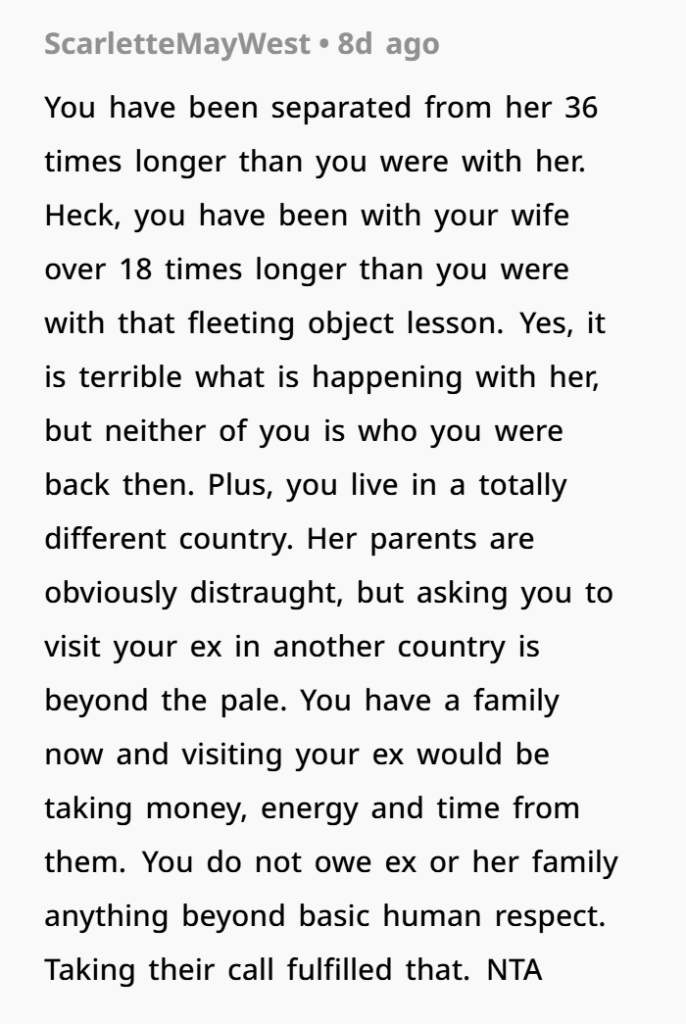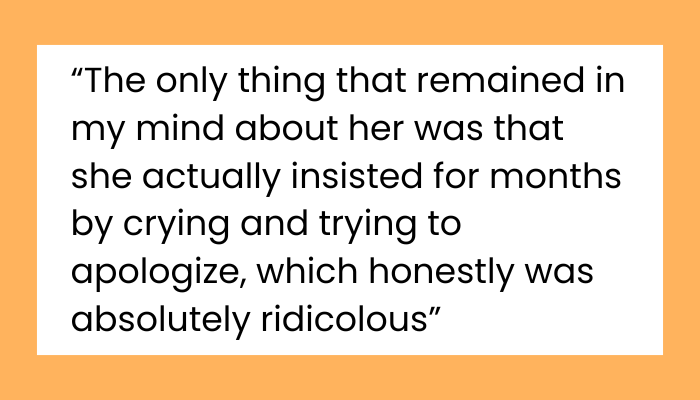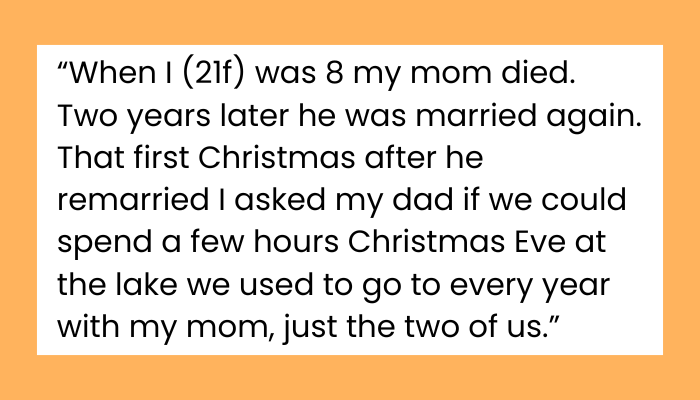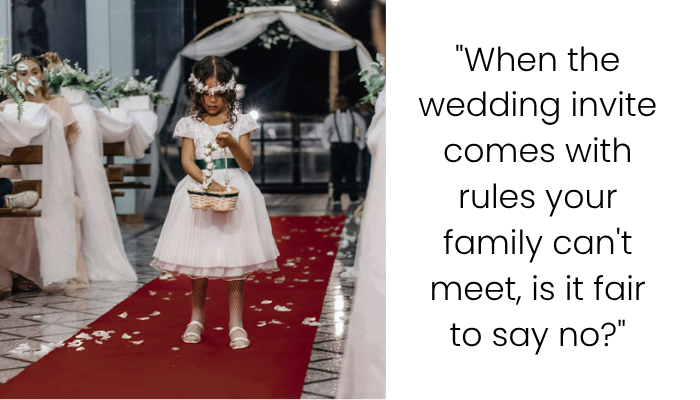AITAH for Refusing to Visit My Ex-Girlfriend Who’s Dying of Cancer?
It’s been six years since the breakup. He barely remembered her—until her parents showed up out of nowhere, begging him to visit their daughter, who’s now terminally ill. She cheated on him, and the relationship only lasted two months. He moved on, built a new life, married a woman he loves, and has a daughter he adores. So when her family came asking for a final meeting, it felt like a ghost trying to crawl out of a closed chapter.
Now, he’s being called cruel and heartless for refusing. Some friends are saying, “What’s the harm in one visit?” But he genuinely doesn’t see the point. He’s not bitter, he’s just done. Is it really so wrong to walk away from someone who hurt you—even if they’re facing death?
A “blast from the past” can sometimes feel more like an unexpected attack than a friendly hello

A man was contacted by the parents of an ex he dated for two months, six years ago











Alright, let’s sit down and really look at this. This kind of situation isn’t black and white—it’s loaded with emotion, personal boundaries, and just plain human messiness. So let’s break it down.
First off, let’s talk about what happened six years ago. You were in a two-month relationship with “G.” Not long, but intense enough for her cheating to leave a mark. You found out she was seeing her ex, and you ended it. That’s a betrayal—plain and simple. Even though it was a short relationship, cheating cuts deep because it breaks something sacred: trust. And once that’s gone, most people never look back.

But here’s where it starts to twist. She didn’t just walk away. She spent months crying and apologizing. Maybe she realized what she lost—or maybe it was guilt. Either way, you made a choice. You said: This isn’t worth my energy anymore. And honestly? That’s healthy. A lot of people get stuck in the emotional spiral, but you didn’t. You moved forward.
Fast forward six years. You’ve built a new life. You’ve got a family. A wife who sounds amazing. A daughter you adore. You even moved countries. So this chapter? As far as you were concerned—it was closed, sealed, done.
Now let’s be real here: when someone reaches out from the past like this, especially under tragic circumstances, it does stir something. Not necessarily love. Not even grief. But confusion. Guilt, even. You’re human. And humans don’t always know what the “right” thing is—especially when death gets involved.
So here’s the big question: are you the asshole for not going?
Let’s talk about emotional closure, which is one of those high CPC keywords you’ll find in self-help and relationship therapy circles. Closure is different for everyone. Some people need a conversation to move on. Some just need time. Others, like you, close the door hard and never look back—and that’s valid too. You’re not heartless for protecting your peace.
What a lot of people don’t understand is that you don’t owe closure to someone who broke your trust. Just because they’re dying doesn’t erase what happened. Forgiveness isn’t mandatory. Especially when the other person had years to reach out—but didn’t—until death was knocking.
Now, let’s look at the emotional manipulation part. G’s parents showing up and framing it like you’re the only thing that can give her peace before she dies? That’s a heavy burden to drop on someone. It’s emotionally loaded and kinda unfair. Yes, they’re grieving. Yes, they’re desperate. But you’re not her emotional savior.
You also mentioned that your wife supports whatever you decide, which is amazing. That says a lot about your marriage. You’ve built something strong, and you’re focused on protecting that. And that’s what matters now—your present. Your family. Your peace of mind.
People love to throw around phrases like “It wouldn’t hurt to visit” or “It’s just one conversation.” But they’re forgetting something huge: reopening old wounds isn’t harmless. It’s not just a walk down memory lane—it’s inviting emotional chaos into a life that’s peaceful.
From a mental health perspective, this is a boundary. You’re setting one. Boundaries aren’t cruel—they’re necessary. Whether it’s toxic family, old friends, or yes—even dying exes—you’re allowed to say: This isn’t good for me.
This also ties into the concept of post-traumatic growth—another fancy term that’s all over high CPC searches. It means growing after trauma by creating a new, stronger version of yourself. That’s exactly what you did. You were hurt, and you built something better. Why risk shattering that progress just to ease someone else’s regret?

And let’s not ignore the resentment that can creep in. If you went to see her out of guilt and it triggered old emotions or caused stress in your marriage, then what? Would you resent being pushed into it? Would you regret letting her back in, even for a moment? These are things people don’t think about when they say “just go.”
Also—let’s be honest—there’s a bit of romanticized martyrdom going on here. People love the idea of a dramatic, emotional reunion. Like it’s a movie moment. But real life isn’t a Nicholas Sparks novel. It’s messy and complicated and sometimes the most loving thing you can do is walk away.
You’re not being cruel. You’re not spitting on her memory. You’re honoring your own healing. If G needed to say something, she could’ve written a letter. She could’ve reached out years ago. But she didn’t. Her regret is hers to carry. Not yours to fix.
And as for the people judging you? Ask them this: “Would you want your spouse to revisit their cheating ex if they were dying?” Bet the answer shifts real quick.
At the end of the day, you’re not the villain in this story. You’re the one who got hurt and moved forward. That doesn’t make you heartless. It makes you whole.
The internet overwhelmingly agreed that his only obligation was to his current family, not his past






You don’t owe anyone a final goodbye just because they’re dying. Especially not someone who broke your heart and left scars behind. Peace isn’t found in old wounds—it’s in the life you’ve built beyond them.







